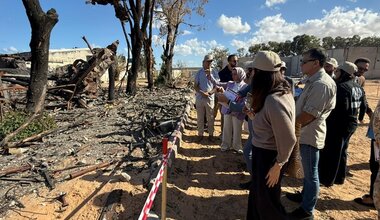Training of trainers to manage the green scale insect pest on date palms in Libya
FAO and IOM enhance Libya's Agriculture Sector's Resilience to Crop Pests
Tunis, 30 January to 3 February 2018 - 29 participants from Libya are attending a five day “Training of Trainers” exercise for better management and control of the current date palm green pit-scale insect (palmaspis phoenicis) outbreak. This emergency project is implemented by the United Nations Food and Agriculture Organization (FAO) and IOM, the UN Migration Agency, with the financial support of the European Union (EU). It aims at helping to preserve the wealth of the Libyan oases, which represent a social and economic asset, with more than 6 million date palm trees spread over a wide geographical area between Kufra, Jallu, Jagala, Jafra, and Fizan.
In his opening remarks, FAO Coordinator for North Africa Mr. Michael Hage said that FAO supports member countries in "improving livelihood resilience against threats or crises", such as emergencies in the food chain, including transboundary pests, plant and animal diseases, and seafood sicknesses. Mr Hage reiterated the importance of date production in Libya as an essential source of income and food, with a production of around 170,000 tons per year. Indeed, this project is part of the support to the Libyan Government to fight against the invasion of the green scale of date palms in the entire the region of Sebha.
The implementation of this emergency project will be done in collaboration with the National Center for Agricultural Protection and Quarantine (NCPQ) of the Ministry of Agriculture, Livestock and Marine Resources, the national partner for this project in Sebha. "We recognize that agriculture remains one of Libya’s most promising sectors, in view of its potential for growth and job creation, as well as its ability to strengthen resilience and help stabilize communities. Unfortunately, agriculture-based livelihoods face serious challenges. One of them is why we are all here today, the presence and spread of crop pests," said Othman Belbeisi, IOM Libya Chief of Mission, at the opening of the training. “Together with FAO and the Libyan Government, we will provide necessary resources and goods, build capacity for technical staff and farmers, and offer technical assistance to limit the spread of the pest to other areas within Libya. The capacity development will also assist local community farmers prepare for the next harvest,” added Belbeisi.
People in Libya depending on agriculture for their livelihood are facing serious challenges. Plant pests severely jeopardize smallholders’ production capacities. If not addressed in time, infestation outbreaks like this can exacerbate poverty and vulnerability, eroding household resilience. Even with the current challenges, agriculture remains one of Libya's promising sectors, in regards to its potential for growth and job creation, as well as, its potential contribution to the resilience of rural communities.
Strengthen capacity for better control of the green scale pest on date palms
This training of trainers will help equip Libya with the knowledge and means to reduce the risk of spread of diseases to manage emergency situations of plant diseases, especially methods of diagnosis of the pests, structured surveys, preventive control and the Integrated Pest Management (IPM) approach developed by FAO. Participants will have a better understanding of date palm green pit scale biology and spread, methods of diagnosis. Trainees will learn survey and identification methodology of green date palm pit scale insect, and will formulate and validate a communication strategy and an action plan for integrated Integrated Pest Management.
At the global level, IOM and FAO co-chair the Global Migration Group (GMG), a technical support to Governments on migration. Recently, the Organizations signed an agreement, which will serve as a basis to mainstream a development approach in global initiatives and fora on migration, highlighting the importance of agricultural and rural development in the context of migration.
 United Nations Peacekeeping
United Nations Peacekeeping UN
UN









